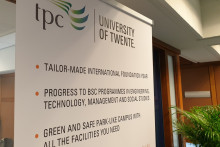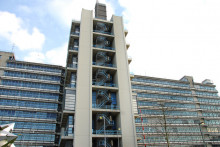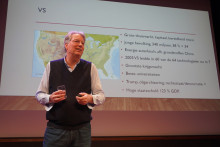Last week, the university council approved the plan to enable the application fee for all UT programmes. At the ET and EEMCS faculties, a pilot for all master's programmes has already been running for several years. Simone Oolhorst (head of Student Affairs & Services) explains that in the pilot, students with an international degree pay 100 euros for their degree evaluation.
With this fee, the UT wants to keep out tentative applicants. 'Some students apply to find out what their degree is worth, without actually wanting to study at UT. Our university is not on the top of their list. At the CES (Centre for Educational Support, ed.) and the faculties, we have to consider every application to see if the bachelor fits a UT master's programme.'
From experience, Oolhorst knows that this creates a high workload for the departments and faculties. With Dutch degrees, it is often immediately clear whether students meet the requirements of a UT programme; foreign degrees require more research. A staff member has to investigate whether a student is admissible using the database of Nuffic, the Dutch organisation for internationalisation in education. 'We spend a lot of time on applications from students with an international diploma.'
According to the head of Student Affairs & Services, a fee leads to more relevant applications. 'Students who are really interested and have already done their own preliminary work on their eligibility will apply, because they are willing to pay a sum of money for this. This way, we increase the percentage of admissible students and ultimately the percentage that actually enroll in a programme at the UT.'
Limited implementation
All UT programmes can make use of the 'application fee'. But so far, only the ET and EEMCS master's programmes are planning to use the application fee. 'At these faculties, there were many applications in the past, with relatively few students actually coming to study at the UT. The pilot showed that the percentage of admitted students at ET and EEMCS actually increased. Nevertheless, two years of Covid make it difficult to paint an accurate picture, as there were fewer enrolments than per usual.'
Several Dutch universities have been using the same system for several years. At the UT the 'fee' only applies to ET and EEMCS master's programmes for the time being. For other faculties, there is currently no need for this, according to Oolhorst. She explains that the UT undergraduate programmes use other instruments to pre-select interested students. 'For example, some programmes have a numerus fixus. Others bachelor programmes use matching, where students are advised whether it is wise to come and study at the UT.'
For the pilot at ET and EEMCS, students get their fee back if they enrol at UT, as a kind of deposit. Now that the measure becomes possible for the whole UT, students will no longer get their fee back. According to Oolhorst, this is because the university actually incurs costs when grading degrees. Moreover, repayment is very labour-intensive. 'Students also understand this. Other universities in the Netherlands use the same system without refunds and so far they have not had any negative reactions from students.'







